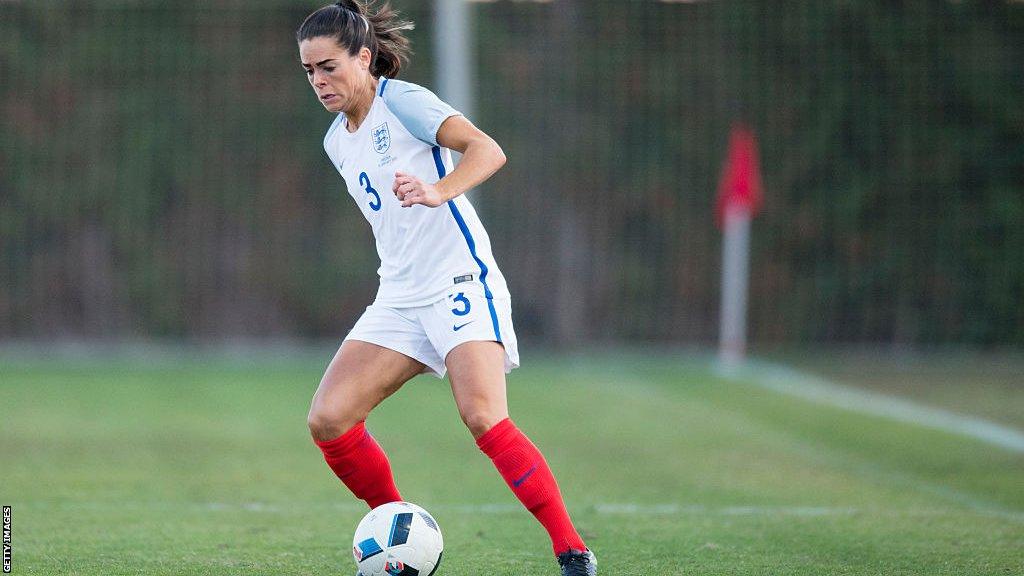Claire Rafferty: Former Lioness says players should not be weighed routinely
- Published
Claire Rafferty on the impact of body shaming
Former England defender Claire Rafferty says players should not routinely be weighed as it is not healthy.
Being weighed frequently from as young as 15 years old, as well as participating in extra training sessions that players called "fat club", led to Rafferty developing an eating disorder, she said.
The 34-year-old wants change for current and future players.
"I would remove weighing, I don't think it's necessary," she said.
"I don't think it's healthy to anyone. I would remove that straight away."
Rafferty, who retired in 2019, won 18 caps for England and played domestically for the Millwall Lionesses, Chelsea and West Ham.
She represented England in the 2011 and 2015 World Cups, winning a bronze medal in 2015. Rafferty also won two Women's Super League titles and two FA Cup trophies with Chelsea.
As a teenager she was involved in England's youth teams, where regular weighing took place.
"I think the day to day life of an athlete revolves around food," she told the BBC's Sports Desk Podcast.
"Days are planned out around the mealtimes. Feeling good, getting most out of your performances from what you eat, but also on the downside of that from a very young age being weighed every morning.
"I remember on international camps from the age of 15 being weighed every morning and as a result becoming very conscious of body image and what you are actually eating."
Rafferty says it was her time with the international team where the weighing came into focus.
She believes it was carried out for physiological and performance purposes.
"We were always in all at once so we could see what other people weighed. It was all common information that was available to everyone and I think it probably should have been done in isolation," she added.
"We should have been educated as to the reasons why they wanted to do it. I think if we were to just educate the players around why then I wouldn't have had as many issues around my image and my identity."
'It's quite shaming'

Claire Rafferty made her England debut in 2010 against Austria
Being weighed was not Rafferty's only concern when she took part in FA sessions at the elite player development centre in Loughborough.
If players had not run a certain amount in a session or if those taking the sessions thought a players' body fat was "higher than they thought it should be", players would have to do extra sessions which were dubbed "fat club".
"I can't remember the staff calling them fat clubs but the players would call it fat club," she adds.
"[We did that] to make light of it because actually it's quite shaming to have to do extra sessions on top of a full-time training schedule, so you had to make a joke out of it."
England's most capped player Fara Williams spoke last year about a similar experience of being in "fat clubs" if players' body fat percentage was considered too high.
'My eating disorder was the only thing I had control over'
Rafferty has spoken about her eating disorder before and told Women in Football, external she battled bulimia "for a time before the binge eating and excessive exercise took over".
She added that she felt her eating disorder was the only thing she had control over.
"I felt that if I'd eaten a lot, I needed to train more and over-exercised to try and compensate," she said. "I knew exactly what I'd weighed the day before and I was incredibly conscious of what my body looked like and how it felt.
"I still am and I guess I always will be. That's the lasting scarring it's left."
A Football Association spokesperson said: "The mental health and physical wellbeing of all players is of paramount importance, and the women's game has evolved significantly in recent years across the professional leagues and within the England teams.
"This includes providing England players with greater support and improved processes to manage diet and nutrition, and the possible psychological impacts associated with this area.
"In the women's professional game we have mandated that all clubs have a player care strategy that includes mental health, wellbeing and nutrition, and we continue to work with the clubs to develop these strategies to ensure better education and action for their players."
If you, or someone you know, has been affected by eating disorders, these organisations may be able to help.